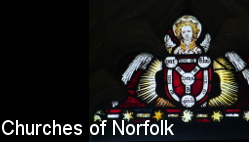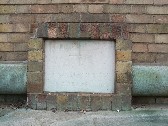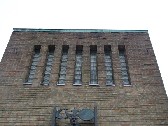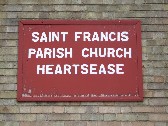| |
|
St
Francis, Heartsease, Norwich Heartsease is a
reasonably pleasant post-war housing estate. Norwich did
not need to expand as much as many cities of a similar
size at the time, but there was a pressing need to
rehouse the people displaced by the combined forces of
the Nazi Luftwaffe and the City Council Planning
Department, particularly of terraced housing in the path
of the new inner ring road; although, of course, that was
probably not the Germans' main motivation for bombing the
city. Perhaps the main disadvantage from which the
inhabitants suffer today is the distance of Heartsease
from the centre of Norwich. It reminds me very much of
the area of north-east Cambridge in which I grew up.
Like so
many of these estates, the central focus of Heartsease is
its Anglican parish church. It doesn't happen today, but
when these post-war schemes were planned the developers
catered for what were then seen as essentials: the
schools, the shops and the churches. Nowadays, I suppose,
we still think that schools are important; but apparently
it is no longer thought necessary to provide for the
spiritual needs of the community. And as for local shops,
who needs them when we have a free bus to the out-of-town
Tesco? Thus, we are steadily impoverished by our own
increasing cleverness.
St Francis
sits at the junction of two roads in the residential
heart of the estate, and it is imposing rather than
large. Its tower is typical of the shopping centres and
department stores of the late 1950s. St Francis, along
with St Benedict, was one of the most popular
non-Biblical dedications for churches at this time,
perhaps reflecting a new and more contemplative theology.
The equivalent church on Ipswich's similar Chantry Estate
is also dedicated to St Francis. The architect here was
JP Chaplin, familiar from work elsewhere in the city, and
the money came partly from War Reparations grants for the
six medieval city churches destroyed by German bombing.
The foundation stone was laid on St Francis's Day, the
4th October 1956.
Thank
goodness for St Francis, not only for its existence, but
for the excellent and little-known sculpture which adorns
its frontage, and which would not be out of place in a
much more metropolitan setting. It depicts the church's
patron Saint in the context of the Canticle of the Sun.
He is standing in the river, with Brother Sun and Sister
Moon above him, and his birds flocking to greet him.
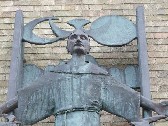 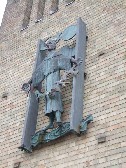 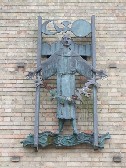 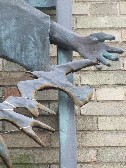 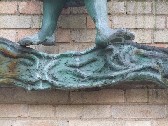
Because
Heartsease is distant from the city centre, and is in any
case little visited, few people seem to have written
about this statue, or even know of its existence. Bill
Wilson, revising Pevsner's Buildings of England:
Norfolk, does not mention the church at all, let
alone the sculpture. I am grateful for the detective work
of Leo Reynolds, who called on the Rector and was pleased
to discover that the church retained newspaper cuttings
about its origins. In fact, the sculpture dates fully
twenty years after the building of the church, although
it always seems to have been the intention that one would
be provided.
| The
artist was Mike Toll, at the time a teacher at
the local Heartsease High School, and it was
created with the help of the school's sixth form
art students. It was paid for by the grandparents
of a child born to a former curate of the church
as a mark of remembrance. The sculpture is made
of bronze, and coated in glass fibre and acrylic
resin. The birds, however, are made of steel, and
although coated in the same way they have
corroded in the last thirty-odd years. It would
be nice if they could be restored. The
pedestal beneath the statue was provided in 1956,
with the intention that a sculpture would some
day be added. As it is, the sculpture of St
Francis is rather more impressive than anything
envisaged at the time, and easily the most
interesting thing on the entire Heartsease
estate.
|
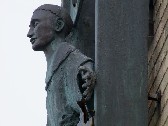 |
|
|
|
|
